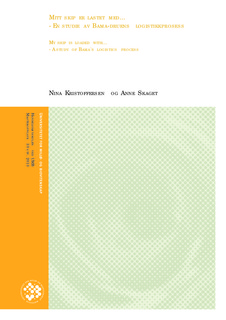| dc.description.abstract | I denne studien har vi kartlagt logistikkprosessen til ett av Bama sine oversjøiske produkter; druer fra Sør-Afrika. Bama har ikke tilstrekkelig kontroll over ledetid og kostnader, og de ønsker mer oversikt over prosessen. Informasjonsutvekslingen i dagens situasjon er heller ikke optimal. Bama vil derfor ha synspunkter på, og forslag til hvordan dette kan forbedres. Etter kartleggingen ble logistikkprosessen analysert, vi fant ut hva som påvirker logistikkprosessen og om det er elementer i den som eventuelt bør endres.
For å undersøke og kartlegge prosessen nærmere hadde vi flere uformelle samtaler med Bama, og samtidig god kommunikasjon med våre kontaktpersoner i Bama per e-post under hele arbeidsperioden. For utfyllende informasjon kontaktet vi i tillegg Bama sine fire leverandører i Sør-Afrika og shippingselskapene som frakter druene fra Cape Town til Oslo. På bakgrunn av den informasjonen vi fikk fra aktørene i forsyningskjeden og relevant teori, analyserte vi logistikkprosessens fordeler og ulemper, samtidig som vi har foreslått alternative løsninger.
Druene blir produsert på ulike steder i Sør-Afrika, deretter fraktet til havnen i Cape Town, så videre med containerskip til Europa. Transporttiden fra Cape Town til Europa varierer med hvilket shippingselskap som benyttes, og det varierer også hvilken havn shippingselskapene laster om druene til mindre skip, som kalles feedere. Feederne frakter druene til Oslo. I noen tilfeller frakter også Bama druene med lastebil fra Europa, og denne transportmetoden bruker kortere tid enn feeder til Oslo.
Hovedproblemet i logistikkprosessen ligger i de internasjonale avtalebetingelsene som benyttes i druetransporten. Bama og leverandørene benytter incotermet CIF. Dette er fordelaktig for begge parter, men allikevel skaper denne avtalen problemer for Bama med hensyn på oversikt og kontroll over logistikkprosessen. Dette casestudiet viser at ved å endre avtalebetingelser vil Bama kunne oppnå bedre oversikt over prosessen, samtidig som at informasjonsflyten med tredjeparten (shippingselskapene) vil forbedre seg.
Videre har vi undersøkt hvilket forhold Bama har til leverandørene og shippingselskapene. Dette fordi Bama ønsker å finne ut om, og eventuelt hvorfor, det er vanskelig å få informasjon fra leverandører og shippingselskaper. På denne måten finner man ut hvor i forsyningskjeden problemet med dårlig informasjonsutveksling ligger. Forholdet mellom Bama og leverandørene påvirker forsyningskjeden på en positiv måte, og det er ikke i dette leddet problemene ligger. Derimot påvirker forholdet mellom Bama og shippingselskapene forsyningskjeden i en negativ retning, fordi det er her problemene med dårlig kommunikasjon oppstår. Dette forårsakes av at Bama ikke er direkte kunde av shippingselskapene, noe som igjen skyldes avtalebetingelsene i CIF-avtalen.
Hovedfunnet i casestudiet, og tiltaket som kan løse problemene med manglende kontroll og dårlig informasjon, blir et bytte av incoterm. Bama bør bytte fra CIF til FOB, på denne måten får de en bedre oversikt over ledetid, kostnader og en bedre informasjonsflyt i forsyningskjeden. this study we have investigated the logistics process for one of Bama’s oversea products: grapes from South Africa. Bama does not have sufficient control over lead time and costs, and they require more information about the process. Information exchange in the current situation is not optimal. Therefore, Bama have requested suggestions on how this can be improved. After initial discussions, the logistics process was analyzed to determine what affects the logistic process and whether there are elements that should be changed.
To study the process further, we had several informal meetings with Bama, addition to continual communication with our contacts by e-mail during the process. For additional information we contacted Bama’s four suppliers in South Africa and shipping companies responsible for the transport of grapes from Cape Town to Oslo. Based on the information we received from participants in the supply chain and relevant theory, we analyzed the logistics process advantages and disadvantages, and we have proposed alternative solutions.
The grapes are produced in various locations in South Africa, moved to the harbor in Cape Town, and shipped to Europe in containerships. The transport time from Cape Town to Europe varies with which shipping company the suppliers use and which harbor the shipping company utilize to transport the grapes from containerships to feeders. The feeders are smaller ships that will then carry the grapes to Oslo.
The main problem in the logistics process is the international agreement terms used for the transport of grapes. Bama and their suppliers use the incoterm CIF. This is beneficial to both parties, yet this agreement creates problems for Bama with respect to control over the logistics process. This case study shows that by changing contractual terms, Bama will be able to obtain better oversight of the process, while the information flow to the third party will improve.
Furthermore, we examined the relationship between Bama, the suppliers and the shipping companies they use. The intent of this assignment was to identify whether, and possibly why, it is difficult to for Bama to collect information from the suppliers and the shipping companies. This identified where in the supply chain the problem of poor information occurs. The relationship between Bama and the suppliers affect the supply chain in a positive way; this communication channel is not where the problem lies. However, the relationship between Bama and the shipping companies affects the supply chain in a negative way; it is here that the problem of poor communication occurs. This is a result of Bama not being a direct customer of the shipping companies, which in turn is due to the terms and conditions of the CIF-contract.
The main finding in this case study, and action that can solve the problems of lack of control and poor information, is a change of incoterm. Bama should change from incoterm CIF to incoterm FOB. This will result in an improved understanding of lead time, costs and a better information flow in the supply chain. | no_NO |
